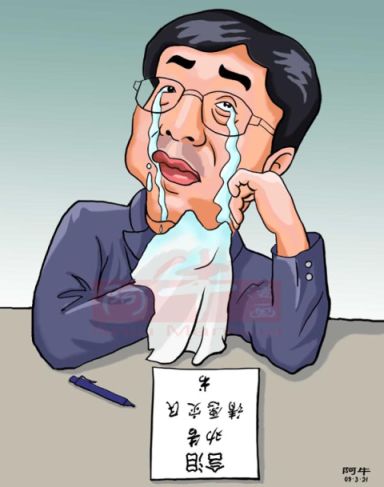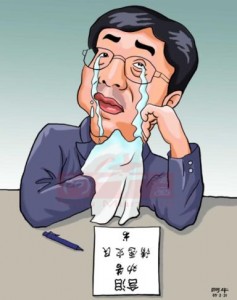The Word of the Week comes from the Grass-Mud Horse Lexicon, a glossary of terms created by Chinese netizens and encountered in online political discussions. These are the words of China’s online “resistance discourse,” used to mock and subvert the official language around censorship and political correctness.
qiūyǔ hánlèi 秋雨含泪
Crocodile tears shed while urging victims of a natural or man-made disaster to silence their grievances; literally “[Yu] Qiuyu has tears in his eyes.” Related to “tearfully urge.”
A month after the May 12, 2008 earthquake in Sichuan, the essayist Yu Qiuyu published “A Tearful Request for the Earthquake Survivors” (含泪劝告请愿灾民), in which he implored parents of the 9,000 students who died in poorly constructed buildings to stop their protests against the government. He suggested that the parents were being used by those with “ulterior motives” and by “anti-Chinese forces.” Many netizens accused Yu of trying to protect the corrupt politicians and contractors whose greed and negligence had led to so many deaths.
After chemical explosions in Tianjin on August 12, 2015 killed 114 and displaced thousands of residents, netizens recalled that “autumn rain has tears”:
Famingrulai (@法明如来): This enormous Asian party dictatorship reaches farther into every corner than the autocratic empire of yore. Human nature has been swallowed up by Party nature, so that all that can come out is “Zhaoshan envies ghosts,” “autumn rain has tears,” and the like. (August 19, 2015)
亚洲这个庞大专制党国其专制无孔不入的程度更甚于古代专制帝国,人性被党性吞噬殆尽,只能出“兆山羡鬼”、“秋雨含泪”之流,不可能出其他。[Chinese]
Can’t get enough of subversive Chinese netspeak? Check out our latest ebook, “Decoding the Chinese Internet: A Glossary of Political Slang.” Includes dozens of new terms and classic catchphrases, presented in a new, image-rich format. Available for pay-what-you-want (including nothing). All proceeds support CDT.









